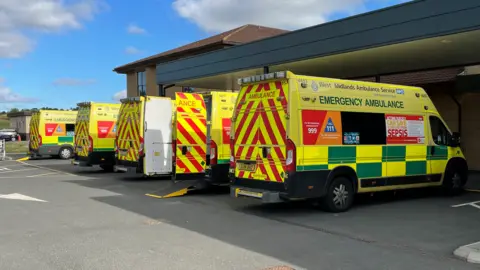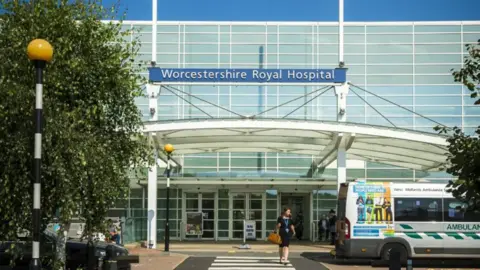Two died on New Year's Eve waiting for ambulance
 BBC
BBCTwo people died on New Year's Eve in the West Midlands while waiting for an ambulance, NHS bosses have confirmed.
A man aged in his 50s, from Staffordshire, had originally been conscious, but the call was later upgraded to a category one, meaning there was a threat to life.
A second patient also died in Worcestershire, with West Midlands Ambulance Service (WMAS) admitting in both cases it was "not a level of service we would ever wish to provide".
WMAS has since apologised to the patients' relatives and launched an investigation, working with the hospitals and integrated care boards.
The BBC has learned that at lunchtime on 31 December more than 100 ambulances in the region had already waiting outside hospitals for more than an hour. They should be back on the road within 15 minutes.
On the previous day, two ambulances had waited outside Worcestershire Royal Hospital for 15 hours and some 999 calls in the county were not dealt with until the following day.
'Worst-performing region'
A WMAS spokesman said: "We would like to apologise to the families of two patients who sadly died whilst waiting for an ambulance to arrive on New Year's Eve. Clearly this is not the level of service we would ever wish to provide."
Research conducted by the Health Service Journal shows the Midlands recorded 24,525 hour-plus handovers from late November to the end of December - more than any other region, and nearly a third of all handover delays in England.
This represents a 64% increase in delays on the same period last year.
The worst handover delays in the country were at University Hospitals Birmingham, which recorded 3,537 hour delays for the period.
Stoke was third, with 2,148, and Worcestershire - despite a new emergency department - was fourth, with 1,784.
Five of the seven worst performers were all in the West Midlands.
 Worcestershire Acute Hospitals NHS Trust
Worcestershire Acute Hospitals NHS TrustWMAS confirmed that when ambulances are delayed handing over a patient at hospital, they cannot respond to the next emergency, which affects the care of patients in the community.
"There is a direct correlation between hospital handover delays and our ability to respond to the next emergency," the trust explained.
"Our staff and volunteers across the service are working exceptionally hard to get to patients as quickly as possible.
"Sadly, we are seeing some patients wait much longer for an emergency response than we would want, as a result of hospital handover delays."
'Continue to work hard'
WMAS added it currently only takes 40% of patients dialling 999 to hospital and spends a large amount of time working hard to use alternative pathways to divert patients away from A&E.
"We rely on each part of the health and social care system to work together to allow our ambulances to get to patients quickly," said a spokesperson.
"We continue to work hard with our partners to reduce the delays, so that we can save more lives."
On Monday, in an attempt to relieve ambulances, Black Country hospitals began a "45 minute rule".
This means more patients will be housed in corridors, but it will help ambulances get back on the road more quickly.
Follow BBC Hereford & Worcester on BBC Sounds, Facebook, X and Instagram.
